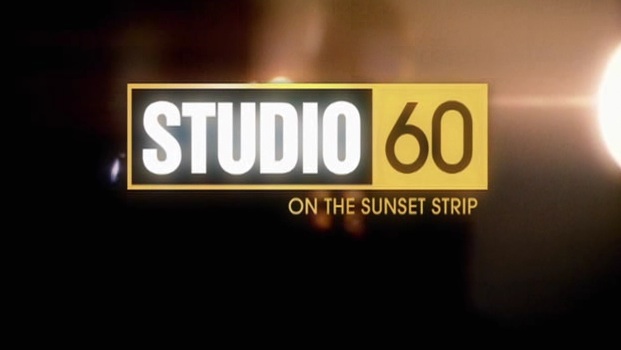The other new American TV show I’m trying to keep up with, via the vagaries of the torrent networks, is Aaron Sorkin’s Studio 60 on the Sunset Strip. Sorkin, you will recall, was the driving force behind The West Wing, and the new show follows the now-established style of rompingly sharp dialogue, implausibly long walk-and-talk discussions, and layers of character interactions. West Wing regular Bradley Whitford stars alongside – no, no, he’s better than you think – Matthew Perry, with a supporting cast of the sort of people you can more-or-less recall from other shows but never quite place. Now five episodes in, the show’s starting to settle down, but my opinions of it remain in some flux.
The first couple of episodes are utterly astonishing television, beautifully crafted to a degree that suggests the rest of us, frankly, might as well give up. Every line, every nuance of performance, the detail of every shot – all drive the narrative with a momentum that could be relentless, yet in Sorkin’s hands becomes joyous, even bravura. I found myself cheering at the sheer audacity of it. Which probably marks me out as a sappy television cheerleader, but never mind.
Whereas The West Wing sustained this level of production for perhaps the first three series, however, Studio 60 is starting to show wobbles surprisingly early. The premise is that the Whitford and Perry characters are hired, at the end of the first episode, to head up a late-night US network TV show that’s modeled closely on Saturday Night Live. And here Sorkin starts to offer easy targets for the critics. The show-within-the-show, you see, simply isn’t very good – Sorkin can write sparkling business exchanges, but he’s never going to compete with a roomful of professional hacks when it comes to comedy sketches.
In truth, this is only a niggling irritation – the show within is merely a driver for the real narrative, yet it’s here that my doubts are strongest. Studio 60 is every bit as magnificently crafted and exquisitely performed as the reported $3m/episode budget would suggest, but it’s not yet clear what it’s about.
Is it an exploration of the rôle of the TV networks in the fabric of American society, portraying their inner workings and the wrangling between editorial control and the power of advertisers, to the detriment of the viewer? Or a portrait of television, cohesive social force, in the throes of (presumed) self-destruction while the upstart new media yaps at its ankles? Or a study of the contradictorily disruptive and uniting nature of high-pressure creative endeavour?
It may not matter. It may just be a rompingly good yarn. But at the moment, magnificent as the writing, performance, cinematography and editing are, Studio 60 is feeling more than a little indulgently self-referential. If it’s not careful, it’ll end up commenting on – and hence parodying – nothing more significant than itself.
